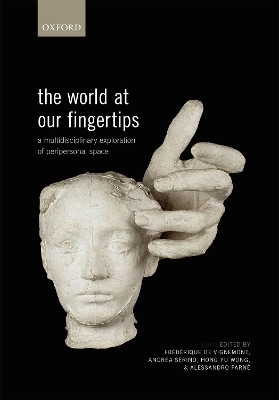
The World at Our Fingertips
Oxford University Press (Verlag)
978-0-19-885173-8 (ISBN)
What difference is there between the visual experience of watching the moon in the sky and the visual experience of seeing a snake slither by your foot?
It is easy to believe our interpretation of the world is split into a binary mode, between the bodily self and everything outside it. There is, however, a buffer zone in the immediate surrounding of the body, known as peripersonal space, in which boundaries are blurred. The notion of peripersonal space calls into question not only our entrenched theories of perception, but also has major implications on the way we perceive personal and social awareness.
Research has yielded a vast array of exciting discoveries on peripersonal space, across a variety of disciplines: ethology, social psychology, anthropology, neurology, psychiatry, and cognitive neuroscience. The World at Our Fingertips: A Multidisciplinary Exploration of Peripersonal Space brings these perspectives together for the first time, as well as introducing a philosophical dialogue to the questions.
Edited by a team of leading psychologists and philosophers in the fields of peripersonal space and bodily awareness, this comprehensive volume presents the reader with a fresh, accessible dialogue between authorities from vastly different areas of thought.
Dr Frédérique de Vignemont is a CNRS senior researcher in philosophy in Paris. She is the deputy director of the Jean Nicod Institute as well as a philosophy scholar in residence at NYU Paris. She is also one of the executive editors of the Review of Philosophy and Psychology. Her research exists at the intersection of philosophy of mind and cognitive science. Upon completing her PhD, she was the recipient of a Fulbright Fellowship to work at NYU, and in 2015 she was awarded the Young Ming & Brain Prize for her achievements in advancing our knowledge of the mind and the brain. She has been published widely in philosophy and psychology journals, and is the author of Mind the Body: An Exploration of Bodily Self-Awareness with Oxford University Press in 2018. Professor Andrea Serino is SNSF Professor at the University Hospital of Laussane, Head of Neuroscience at MindMaze, and Invited Professor at the Center for Neuroprosthetics at the EPFL. He completed his PhD in Neuropsychology at the University of Bologna, where he was assistant professor from 2006-2012. His main research focus is understanding the neural and cognitive basis of the body and self-experience in space. He has been widely published in international peer-reviewed journals, such as Neuron, Stroke, and Brain. In 2006, he was awarded the De Renzi Prize by the Italian Society of Neuropsychology, and in 2016 he was the recipient of the Leenards Prize for translational research. Professor Hong Yu Wong is Chair of Philosophy of Mind and Cognitive Science at the Philosophisches Seminar and Head of the Philosophy of Neuroscience (PONS) Research Group at the Werner Reichardt Centre for Integrative Neuroscience, University of Tübingen. He is also a faculty member of the Max Planck Neural and Behavioural Graduate School and the Tübingen Cognitive Science Programme. His primary research interests concern the relations between perception and action, and the role of the body in structuring these relations. His honours include a Templeton Foundation ACT Fellowship (2017-2020), the Annual Essay Prize for work on multimodality from the Centre for Philosophical Psychology, University of Antwerp (2012), and the European Science Foundation's CNCC Essay Award for interdisciplinary work on consciousness (2008). Dr Alessandro Farnè is INSERM senior researcher with the ImpAct team at the Lyon Neuroscience Research Centre.
Frédérique de Vignemont, Andrea Serino, Hong Yu Wong, and Alessandro Farnè: Peripersonal space: A special way of representing space
Part I : Perception, Prediction and Action
1: Jean-Paul Noël, Tommaso Bertoni, and Andrea Serino: Peri-Personal Space as an Interface for Self-Environment Interaction; A Critical Evaluation and Look Ahead
2: Elvio Blini, Alessandro Farnè, Claudio Brozzoli, and Fadila Hadj-Bouziane: Close is better: visual perception in peripersonal space
3: Justine Cléry and Suliann Ben Hamed: Functional networks for peripersonal space coding and prediction of impact to the body
4: H.C. Dijkerman and W.P. Medendorp: Visuotactile predictive mechanisms of peripersonal space
5: Catherine L. Reed and George D. Park: Functional Actions of Hands and Tools Influence Attention in Peripersonal Space
6: Wayne Wu: Dissecting the Experience of Space as Peripersonal
Part II : Space and Maps
7: Colin Klein: Do we represent peripersonal space?
8: RJ Bufacchi and GD Iannetti: What do "PPS measures" really reflect?
9: Frédérique de Vignemont: Feeling the world as being here
10: Mohan Matthen: The dual structure of touch: the body vs peripersonal space
11: Alisa Mandrigin and Matthew Nudds: Sameness of Place, and the Senses
12: Adrian Alsmith: The structure of egocentric space
III: The Space of Self and Others
13: Matthew Fulkerson: Peripersonal Space, Bodily Self-Awareness, and the Integrated Self
14: Yann Coello and Tina Iachini: The social dimension of peripersonal space
15: Michela Candini, Giuseppe di Pellegrino, and Francesca Frassinetti: Action and social spaces in typical development and in Autism Spectrum Disorder
16: Anders Pape Møller: Risk-taking behavior as a central concept in evolutionary biology
17: Michael Graziano: Human Emotional Expression and the Peripersonal Margin of Safety
| Erscheinungsdatum | 02.04.2021 |
|---|---|
| Verlagsort | Oxford |
| Sprache | englisch |
| Maße | 178 x 253 mm |
| Gewicht | 824 g |
| Themenwelt | Geisteswissenschaften ► Philosophie |
| Geisteswissenschaften ► Psychologie ► Test in der Psychologie | |
| Naturwissenschaften ► Biologie ► Humanbiologie | |
| Naturwissenschaften ► Biologie ► Zoologie | |
| ISBN-10 | 0-19-885173-1 / 0198851731 |
| ISBN-13 | 978-0-19-885173-8 / 9780198851738 |
| Zustand | Neuware |
| Informationen gemäß Produktsicherheitsverordnung (GPSR) | |
| Haben Sie eine Frage zum Produkt? |
aus dem Bereich


